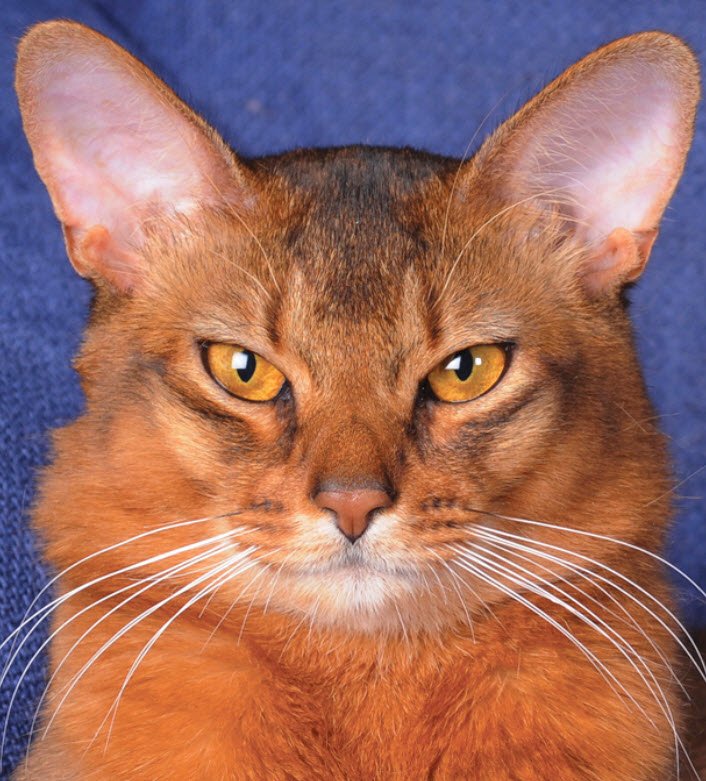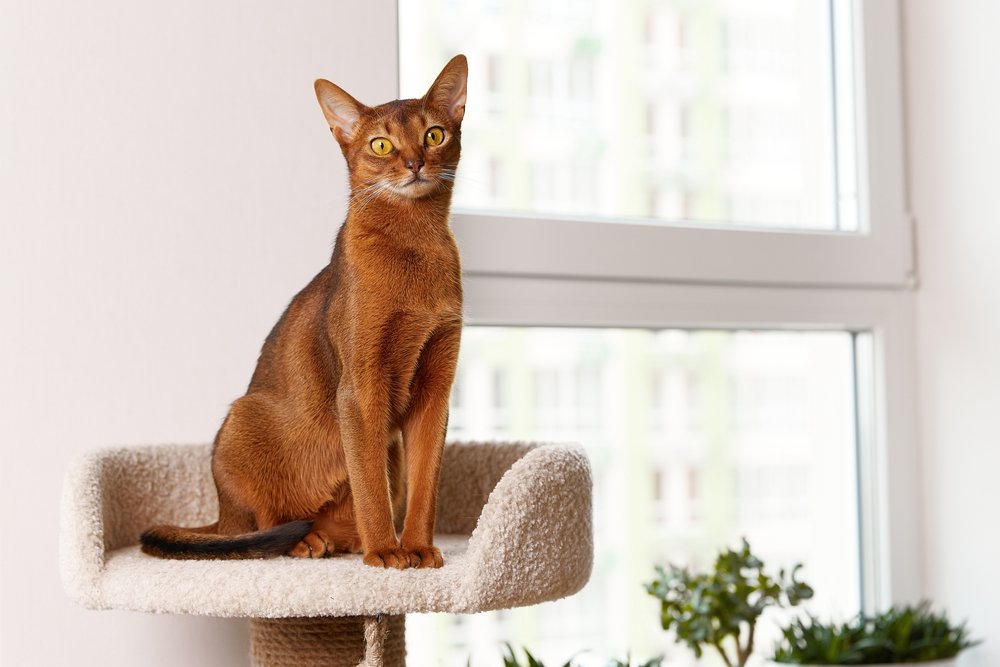Abyssinian
Known as one of the oldest and most elegant breeds in the feline world, the
Abyssinian cat is noted for its athletic appearance, short, glossy coat, and curious, active personality. Originating in northeast Africa, this breed is thought to be related to cats worshipped in ancient Egypt, thanks to its similarity to depictions of cats in ancient Egyptian artwork. With its playful and intelligent nature, the Abyssinian is ideal for families and cat lovers looking for an active and affectionate companion. Find out all about this fascinating breed, from its history to its care and unique characteristics.


Personality
The Abyssinian cat is known for its lively and energetic character. It is a curious, intelligent and extremely sociable feline. It enjoys interacting with people and is known to follow its owners around the house. It also gets along well with other cats and pets, as long as it receives enough attention.
- Active: They love to climb, explore and play, so they need an enriched environment with toys and scratching posts.
- Affectionate: Although independent, Abyssinians form strong bonds with their owners and enjoy human company.
- Intelligent: This breed stands out for its ability to learn tricks and solve problems, making it an entertaining and stimulating cat.
Origins
Country of origin: Abyssinia (Ethiopia)
Other names: Abyss
The name “Abyssinian” comes from Abyssinia, which is what we now know as Ethiopia. However, recent research indicates that this breed probably did not originate there, but in regions near Southeast Asia, such as India or Egypt.

Historical Roots of the Abyssinian Cat
One of the most popular theories associates the Abyssinian cat with the sacred cats of ancient Egypt. Its elegant silhouette, large ears and almond-shaped eyes recall the depictions of cats in Egyptian tombs and murals. These cats were revered as symbols of protection and divinity.
Modern Abyssinians, however, began to gain recognition in the 19th century. The first specimens are believed to have been brought to Europe from Abyssinia by British soldiers after the Anglo-Abyssinian War (1868). The breed was officially registered in England in the 1870s.
Genetic Evidence
Genetic studies have revealed that the Abyssinian cat has links to wild cats originating in regions of Southeast Asia and India, rather than Ethiopia directly. This breed is descended from cats that lived near early human civilizations, where they began to coexist with people thanks to their hunting instinct and ability to control pests.
Unique Features of the Abyssinian
The Abyssinian is not only notable for its history, but also for its unique features:
- Coat: Short, dense and shiny, with a “ticking” pattern that gives it a wild appearance.
- Personality: Active, intelligent and extremely affectionate, they are known as one of the most social breeds.
- Appearance: Athletic and stylized body, large ears and expressive eyes in green or gold tones.
The Abyssinian in the Modern World
Today, the Abyssinian cat is one of the most beloved breeds by cat lovers due to its exotic appearance and friendly character. Although it retains an air of mystery, its playful nature makes it an ideal companion for active families and homes.
The Abyssinian cat combines elegance, history, and a unique character. From its possible connections to the sacred cats of ancient Egypt to its popularity today, this breed continues to captivate feline lovers around the world.
Health
Abyssinian cats can suffer from an inherited condition called pyruvate kinase deficiency which causes anemia. There is a reliable test for this condition, so we advise prospective owners to ask the breeder if their cats have been tested and are free of the condition. An eye problem called progressive retinal atrophy which causes progressive blindness has been documented in some countries, so it would be a good idea to ask the breeder about this as well.
Nutrition
Every cat is unique and has its own particular likes, dislikes and needs when it comes to food. However, cats are carnivores and must obtain 41 different and specific nutrients from the foods they eat. The ratio of these nutrients will vary depending on age, lifestyle and overall health, so it is no surprise that an energetic, growing kitten needs a different balance of nutrients in its diet than a less active senior cat. Other considerations to keep in mind include feeding the right amount of food to maintain “ideal body condition” according to feeding guidelines and catering to individual preferences when it comes to dry or wet food recipes.
Cleanliness
The Abyssinian’s coat is easy to care for. It likes to be combed and brushed, but if you really want to achieve a “professional” shine, you can do so by gently massaging it with a damp chamois to bring out the full shine of the coat. As with all cats, this breed needs regular vaccinations, anti-parasite control and annual veterinary check-ups
Best cat breeds for kids
Although the Abyssinian cat tends to be excellent with children, each cat has a different personality depending on its training and life experience. If you are adopting a cat, check with the association for more details about the specific personality of the cat in question.
People who have seen this breed have also visited…
In this section you can find completely detailed information about the breed of your cat.
